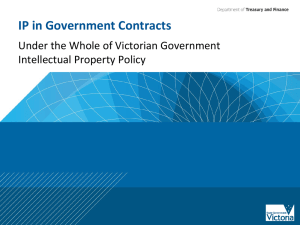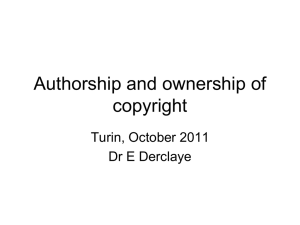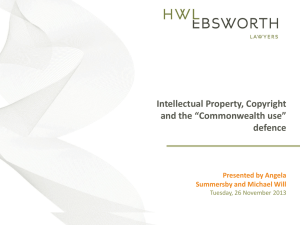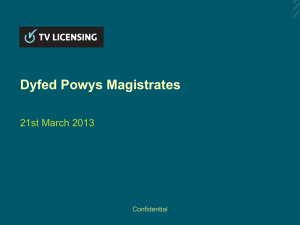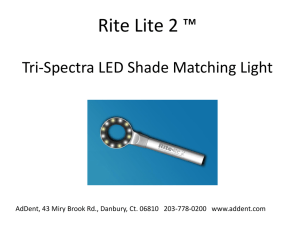Licence lite – a new route to market for smaller
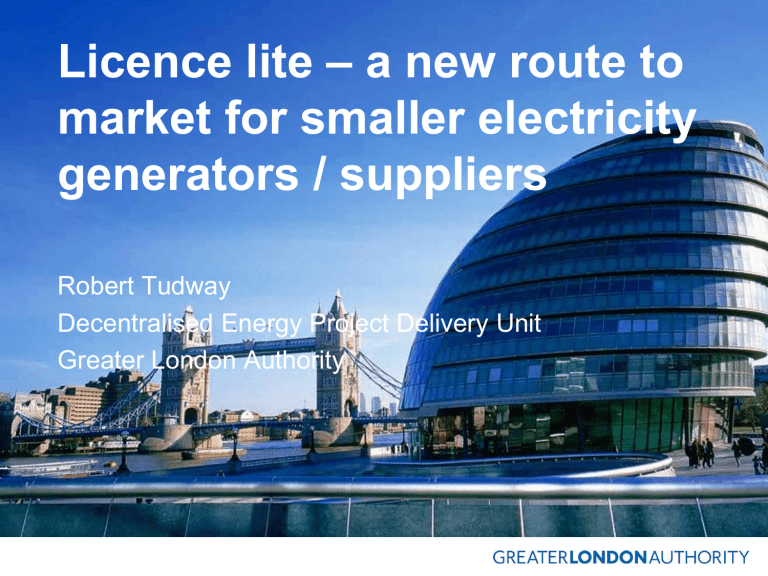
Licence lite – a new route to market for smaller electricity generators / suppliers
Robert Tudway
Decentralised Energy Project Delivery Unit
Greater London Authority
What is licence lite?
Licence Lite is a means by which small generators / suppliers can gain direct access to the retail market, rather than relying on the sale of their output wholesale to licensed suppliers retail consumer wholesale licensed supplier generator
Licence lite is a universal regulatory solution for any smaller scale electricity generator wanting to supply direct to consumers retail consumer generat or
The regulatory structure for licence lite was contained in proposals put forward by Ofgem in February 2009
Why is the Mayor of London interested in licence lite?
• The Mayor is committed to substantial expansion of decentralised energy in London involving both heat and power
• These objectives are supported by Government policy and the potential for DE [‘The future of heating –meeting the challenge’ chapter 2]
• Licence lite allows for the recovery of value lost if small packets of power are purchased by large scale suppliers
• Much of London’s DE will be CHP fired district heating, the economics of which can be substantially increased if the full retail value of the output of smaller scale electricity generation can be realised after deduction of costs.
The business model
Tariff paid by consumer
Deduction by the
GLA of its costs from gross revenues received
Net sales revenue and pass through of market and contract liabilities on the supply of the power to the consumer
Why the GLA as licence holder?
• The GLA can aggregate the generation output of the London
Boroughs and other public sector sources and achieve critical mass
• The Mayor’s licence application is a new venture with possible challenging barriers to cross . The Mayor is in a good position to help deliver implementation, with Ofgem
How does licence lite work?
Licence lite enables a supplier to be licensed, like any other supplier, by relieving the licensee of costs risks and complexities of the electricity market which it is impractical for a small generator
/supplier to handle.
But that is subject to a requirement that the licence lite licensee procure the necessary market services from a fully licensed supplier, enabling the licence lite licensee’s supplies to be handled by the
Fully licensed supplier / provider market systems of market interface services
Licence lite generator / supplier
Electricity consumer
This is distinct from ‘white label’ supply, where the ‘white label’ party in not independently licensed
Will the economics work?
• Initial modelling shows the economics should work, subject to keeping costs proportionate, but that depends upon estimates of the cost of the market interface services being broadly correct and the adoption of a simple business model
• The market interface services – their costs will be known through inviting tenders from fully licensed suppliers
• A simple business model – initially no domestic consumers / limited numbers of sources of generation and consumers
The GLA business model is designed around simplicity and the pass through of costs and liabilities to the generators who benefit from the licence lite operation
Limited number of commercial consumers TfL only to begin with?
Back office/billing costs reflective of small commercial customer base
One step at a time and keep it simple
Add more consumers / domestic consumers private sector sources of generation as financial performance and
GLA policy permit
What are the issues / barriers in taking licence lite forward?
Making licence lite work involves resolving a range of novel issues and until that is accomplished, the extent of any barriers to licence lite implementation cannot be assessed accurately.
• The costs of the market interface services and the willingness of the market to provide them will not be known by the GLA until a tendering exercise has been done
• There are regulatory issues yet to be resolved, for example supplier of last resort questions
Enabling smaller supplier / generators to have an independent route to market is seen by the Mayor as an important matter, particularly in view of the
Mayor’s objectives for decentralised energy in London.
Significant barriers may be found but if so they will form the agenda for future progress
Timing and progress
The timing is still speculative because there are limits in predicting the issues arising and the time to resolve them
March 2013 GLA makes licence lite application to
Ofgem
October 2013
December 2013
April 2014
ITTs to prospective suppliers of market interface services
Full business model prepared for approval by the Mayor containing actual market interface costs and all back office costs
GLA begins licence lite operation
But much solid work in identifying and defining the market interface services required and the regulatory issues to be resolved has already been done.
